Classic Works on the Westminster Shorter Catechism (34 vols.)
Digital Logos Edition
This product has been transferred from Community Pricing to Pre-Pub. The actual funding level may be lower than it appears, which could delay production. The amount of funding still needed will be evaluated and updated soon.
Overview
The question-and-answer form of catechesis was popularized by Martin Luther, with the goal of teaching the meaning and application of Scripture and the creeds, as opposed to simple memorization. Realizing that more modern clerical instruction has left many evangelicals without a foundation in basic doctrine, Reformed theologian J. I. Packer remarked, “For the rest of my life this is what I shall be at, trying to promote the catechism.” For centuries, the Westminster Shorter Catechism has been the standard in Reformed catechesis, introducing youth and new believers to fundamental doctrines, and constantly refreshing the faith of mature Christians.
Select Works on the Westminster Shorter Catechism includes 35 volumes of enduring scholarship, including John Flavel’s and Matthew Henry’s expositions, Thomas Watson’s A Body of Practical Divinity, James Fisher’s question-and-answer explanation of the Catechism, and Ashbel Green’s Lectures on the Shorter Catechism. A variety of classic resources ranging from history to criticism make this an invaluable resource for studying the Westminster Shorter Catechism.
With Logos Bible Software, this valuable volume is enhanced with cutting-edge research tools. Scripture citations appear on mouseover in your preferred English translation. Important terms link to dictionaries, encyclopedias, and a wealth of other resources in your digital library. Powerful topical searches help you find exactly what you’re looking for. Tablet and mobile apps let you take the discussion with you. With Logos Bible Software, the most efficient and comprehensive research tools are in one place, so you get the most out of your study.
Reviews
4 ratings
Key Features
- Thirty-four classic resources on the Westminster Shorter Catechism
- Enduring works from Matthew Henry, Thomas Watson, Thomas Vincent, and others
- Various resources ranging from history to criticism
Product Details
- Title: Classic Works on the Westminster Shorter Catechism
- Volumes: 34
- Pages: 12,205
Individual Titles
- The Shorter Catechism of the Westminster Assembly of Divines: With Historical Account and Bibliography by William Carruthers
- Catechisms of the Second Reformation: With Historical Introduction and Biographical Notices by Alexander F. Mitchell
- Twelve Questions and Answers from the Shorter Catechism: Here Set to Music by John Fox and Edna A. Jones
- An Exposition in the Form of Question and Answer of the Westminster Assembly’s Shorter Catechism by James Harper
- Notes on the Shorter Catechism by William P. Mackay
- The Shorter Catechism: With Proofs, Analyses, and Illustrative Anecdotes by Robert Steel
- An Exposition of the Shorter Catechism by Stewart D. F. Salmond
- A Concise System of Theology on the Basis of the Shorter Catechism by Alexander Smith Paterson
- Home Lessons on the Old Paths: Conversations on the Shorter Catechism by Mary Thomson Symington
- Illustrations of the Shorter Catechism: For Children and Youth, vol. 1 by Jonathan Cross
- Illustrations of the Shorter Catechism: For Children and Youth, vol. 2 by Jonathan Cross
- The Child’s Book on the Westminster Shorter Catechism by James R. Boyd
- The Westminster Shorter Catechism: With Analysis, Scriptural Proofs, Explanatory and Practical Inferences, and Illustrative Anecdotes by James R. Boyd
- A Commentary on the Shorter Catechism by Alexander Whyte
- An Explanation of the Assembly’s Shorter Catechism by Thomas Vincent
- An Exposition of the Assembly’s Catechism with Practical Inferences from Each Question by John Flavel
- The Assembly’s Shorter Catechism Explained: By Way of Question and Answer by James Fisher
- A Key to the Shorter Catechism by James Gall
- The Assembly’s Shorter Catechism: Catechetically Illustrated and Practically Applied by the Free Church of Scotland
- The Westminster Assembly's Shorter Catechism: With Which is Incorporated a Scripture Catechism in the Method of the Assembly’s by Matthew Henry
- Lectures on the Shorter Catechism of the Presbyterian Church in the United States of America: Addressed to Youth, vol. 1 by Ashbel Green
- Lectures on the Shorter Catechism of the Presbyterian Church in the United States of America: Addressed to Youth, vol. 2 by Ashbel Green
- The Chief End of Man: An Exposition of the First Answer of the Shorter Catechism by John Hall
- The Assembly’s Shorter Catechism: Illustrated by Appropriate Anecdotes by John Whitecross
- A Body of Practical Divinity in a Series of Sermons on the Shorter Catechism by Thomas Watson
- Exercises on the Shorter Catechism: In Which the Answers Are Minutely Dissected
- A Practical Exposition of the Assembly’s Shorter Catechism: Exhibiting a System of Theology in a Popular Form, and Particularly Adapted for Family Instruction, vol. 1 by Henry Belfrage
- A Practical Exposition of the Assembly’s Shorter Catechism: Exhibiting a System of Theology in a Popular Form, and Particularly Adapted for Family Instruction, vol. 2 by Henry Belfrage
- An Example of Plain Catechising upon the Assembly’s Shorter Catechism by John Willison
- Theology in a Series of Sermons: In the Order of the Westminster Shorter Catechism, vol. 1 by John McDowell
- Theology in a Series of Sermons: In the Order of the Westminster Shorter Catechism, vol. 2 by John McDowell
- A Brief Explanation of the Assembly’s Catechism by John Brown
- Exposition: Critical, Doctrinal, and Practical of the Assembly’s Shorter Catechism by Michael Arthur
- A Compleat Body of Divinity in Two Hundred and Fifty Expository Lectures on the Assembly’s Shorter Catechism by Samuel Willard
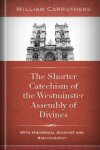
William Carruthers’ volume on the Shorter Catechism provides an important facsimile of the first edition, notes on the Catechism from the Westminster Assembly minutes, and extensive bibliographical information on different editions, translations, modifications. He also includes an annotated bibliography of secondary literature studying the Shorter Catechism.
William Carruthers (1830–1922) was a Scottish botanist and historian. He was keeper of the botanical department at the Natural History Museum and was a consulting botanist to the Royal Agricultural Society. He was educated at the Moffat Academy and graduate from Edinburgh University.
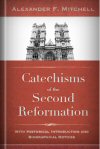
Alexander F. Mitchell’s Catechisms of the Second Reformation is divided into two parts. The first covers the Westminster Shorter Catechism and its Puritan precursors, while the second covers Rutherford’s catechism from the same time period. Mitchell includes a historical introduction and biographical notes.
Alexander F. Mitchell (1822–1899) was professor emeritus of church history at St. Andrews University. Plagued with health issues, Mitchell often found rest working in the solitude of his small farm. Even on his death bed, he never stopped studying Scripture and sharing his insight with others.
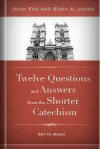
This unique volumes features the sheet music for John Fox and Edna A. Jones’ setting of a dozen questions and answers from the Westminster Shorter Catechism, beginning with the famous, “What is the chief end of man?” and ending with the “benefit believers receive from Christ at the resurrection.” Musical arrangements such as this are a unique window into rich traditional history of catechesis.
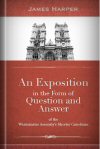
Taking the same form as the Shorter Catechism itself, James Harper’s Exposition testifies to the effectiveness of the question and answer format. Harper uses the format through his text. He pays special attention to the “points of controversy between Protestants and Romanists.”
James Harper (1859–1938) was an Anglican priest. He was educated at Aberdeen University and ordained in 1881. He was dean of St. Andrews, Dunkeld and Dunblane.
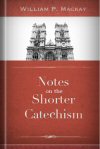
This volume contains William P. Mackay’s posthumously published commentary on the Westminster Shorter Catechism, Notes on the Shorter Catechism. Mackay addresses each point of the Catechism one by one. Notes on the Shorter Catechism is a valuable resource for the study both of the Westminster Catechism and of nineteenth-century scholarship on the Catechism.
William P. Mackay (1839–1885) graduated from the University of Edinburgh, initially working as a doctor. In 1868 he left medicine to become the pastor of a Presbyterian Church in Hull.
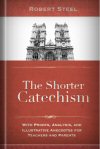
This volume, written for teachers and parents, provides helps for using the Westminster Shorter Catechism for instruction. Steel includes proofs from Scripture, analyses of doctrine, and illustrative anecdotes. This volume is a valuable resource for studying both the Westminster Short Catechism and the history of catechetical methods in general.
Robert Steel (1827–1893) was a Presbyterian minister in colonial Australia. He was born in Wales to Scottish parents. He was educated at Aberdeen and Edinburgh universities and earned his PhD from the University of Gottingen. In 1861 he took over the pastorate of Macquarie Street church in Sydney, Australia. He helped establish St. Andrew’s College at the University of Sydney, where he tutored in Theology.
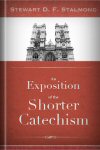
This volume contains all three parts of Stewart D. F. Salmond’s “An Exposition of the Shorter Catechism.” Part one covers the summary of Christian doctrine (questions 1–38), the law (questions 39–81), and the way of life (questions 82–107). Salmond writes that the Shorter Catechism “has never failed to be esteemed where Bible truth has been loved, and the principles of the great Puritans valued.”
Stewart D. F. Salmond (1838–1905) was a professor of theology at Aberdeen Free Church College. His works include St. Mark: Introduction, Ulrich Zwingli, and The Epistle to the Ephesians.
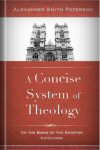
This volume, from church historian Alexander Smith Paterson, offers a systematic theology based on the Westminster Assembly’s Shorter Catechism. This edition includes an introductory paper by Duncan Macfarlan.
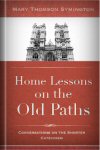
Mary Thomson Symington’s work, Home Lessons on the Old Paths: Conversations on the Shorter Catechism, gives an exposition of the Catechism in the form of a narrative between a mother and her son. Symington addresses each point of the Catechism in a new conversation. Symington’s work is a charming look into the importance of the Catechism, both historically and as a tool for instruction
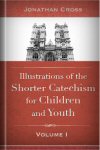
Jonathan Cross had memorized the Shorter Catechism by the age of six and it “seemed to be of no more use to him than old lumber in the garret.” Later in life, Cross detected a lack of engaging materials to help youth in moving beyond memorization. Cross wrote this two volume work, addressing all 107 questions, to fill this void. It is a valuable resource for examining the history of catechetical instruction and the Westminster Shorter Catechism. Volume one covers questions 1 through 53.
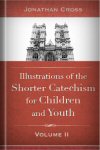
Jonathan Cross had memorized the Shorter Catechism by the age of six and it “seemed to be of no more use to him than old lumber in the garret.” Later in life, Cross detected a lack of engaging materials to help youth in moving beyond memorization. Cross wrote this two volume work, addressing all 107 questions, to fill this void. It is a valuable resource for examining the history of catechetical instruction and the Westminster Shorter Catechism. Volume one covers questions 54 through 107.
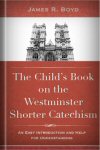
James R. Boyd wrote The Child’s Book on the Westminster Shorter Catechism to serve as a straightforward introduction, and an aid for understanding and memorizing the Catechism. Designed for children 12 years and under, it reshapes many of the questions into simpler language.
James Robert Boyd (1804–1890) was the author of several instructional texts on the Westminster Catechism.
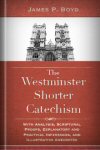
James R. Boyd’s exposition of the Shorter Catechism includes Boyd’s commentary, proofs from Scripture, and notes and illustrations for practical application. Boyd divides his work into two sections: “what we are to believe concerning God,” and “the duty which God requires of man.” Though more complex than his exposition of the Catechism for children, Boyd maintains his straightforward, readable voice throughout.
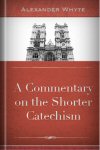
In his A Commentary on the Shorter Catechism, Alexander Whyte uses a verse-by-verse style to create his commentary. This work is the culmination of years of teaching the Shorter Catechism in Bible classes. Designed for family and private use, it is full of practical notes and illustrations.
Alexander Whyte (1836–1921) was a popular preacher and writer. He attended the University of Aberdeen and New College in Edinburgh. Whyte served as an assistant minister at Free St. Johns in Glasgow. Following that, he was a colleague at Free St. George’s in Edinburgh.
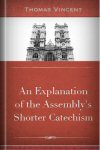
Thomas Vincent’s Explanation of the Assembly’s Shorter Catechism has become an enduring classic work. Vincent wrote the Explanation as a tool for family devotion and instruction. The Presbyterian Board of Publication, not given to flourishing words of praise, wrote in the preface that Vincent’s volume is “very worthy of acceptation.”
Thomas Vincent (1634–1678) was an English Puritan minister and author. He attended Christ Church, Oxford and was chaplain for the second Earl of Leicester. In 1656 he was incorporated at Cambridge. Seven members of his household were killed by the Great Plague of London. This experience is reflected in the tone of many of his writings.
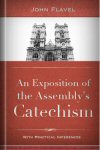
John Flavel’s Exposition of the Assembly’s Catechism debuted in 1688. It has been an enduring classic work on the Catechism. Flavel was 16 when the Westminster Assembly first convened, and writing only a generation removed from most of the Westminster divines, his perspective is invaluable to the study of their work.
John Flavel (1627–1691), whose father was persecuted for not obeying the Church of England. Flavel followed in his father’s footsteps as a Presbyterian clergyman and was forced to minister in secret due to the Act of Uniformity in 1662 under Charles II. The Act was repealed for a time under James II in 1687, allowing those not serving in the Church of England to minister freely. Flavel was known as a man of integrity and deep commitment to God.
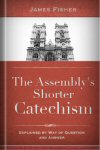
James Fisher’s explanation of the Westminster Short Catechism is still widely read and has been an important volume in the history of work on the Shorter Catechism. It remains a valuable resource for studying the Shorter Catechism.
James Fisher (1697–1775) was one of the founders of the Scottish Secession church. He married the daughter of Ebenezer Erskine
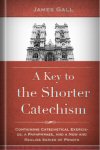
A Key to the Shorter Catechism contains catechetical exercises, a paraphrase of the Shorter Catechism, and Scripture proofs for each question and answer. The work focuses on strategies for helping students understand the Shorter Catechism.
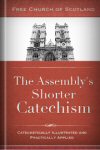
This volume on the Westminster Shorter Catechism is designed for public and private instruction. It was compiled by an anonymous elder of the Free Church of Scotland from his notes for a Sunday school class. It includes helpful illustrations and practical applications.
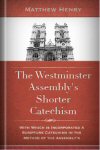
In this volume, the well-known seventeenth-century commentator Matthew Henry provides his own commentary, also in the catechetical form, on the Westminster Shorter Catechism. It is a valuable resource on the Shorter Catechism from a standard-setting commentator.
Matthew Henry (1662–1714) was an English Presbyterian Minister. His father, also a minister, was ejected under the Act of Uniformity of 1662. Matthew Henry abandoned legal studies for theology and became the minister of a congregation in Chester. He founded the Presbyterian Chapel in Trinity Street. He is best known for his standard-setting commentary and analysis
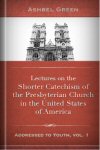
This widely-read work from Ashbel Green, the third chaplain of the House of Representatives, is a classic study on the Westminster Shorter Catechism. It is composed of a series of lectures Green gave to the youth of his congregation. Volume one contains the first 33 lectures.
Ashbel Green (1762–1848) was an American Presbyterian minister. He served in the New Jersey Militia during the Revolutionary War and graduated valedictorian from Princeton in 1783. He was the chaplain of the United States House of Representative from 1792 to 1800, and the president of Princeton University from 1812 to 1822.
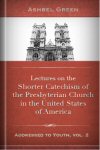
This widely-read work from Ashbel Green, the third chaplain of the House of Representatives, is a classic study on the Westminster Shorter Catechism. It is composed of a series of lectures Green gave to the youth of his congregation. Volume one contains the last 34 lectures.

This volume from Presbyterian minister John Hall focuses on the famous first question of the Westminster Shorter Catechism, “What is the chief end of man?“ John Hall expounds upon the Catechism’s answer, as well as secondary ends of man and the different ways man glorifies God.
John Hall was pastor of the First Presbyterian Church in Trenton, New Jersey.
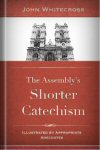
Originally published in 1828, this classic volume on the Westminster Shorter Catechism features vivid anecdotes of personal experiences with all 107 questions of the Catechism. It is a charming devotional volume and a valuable window into the historical study of the Shorter Catechism.
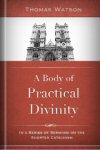
This important volume from Thomas Watson features a series of catechetical sermons. The work reflects Watson’s passion for preaching and contains 176 sermons.
Thomas Watson's Body of Practical Divinity is one of the most precious of the peerless works of the Puritans; and those best acquainted with it prize it most. Watson was one of the most concise, racy, illustrative, and suggestive of those eminent divines who made the Puritan age the Augustan period of evangelical literature. There is a happy union of sound doctrine, heart-searching experience and practical wisdom throughout all his works, and his Body of Divinity is, beyond all the rest, useful to the student and the minister.
Thomas Watson (1620–1686) was an English vicar, Puritan, and Nonconformist. He received his MA from Emmanuel College in Cambridge. A popular preacher, Watson was rector of St. Stephen’s parish in Walbrook, London for sixteen years, until he was ejected for nonconformity. He continued a private ministry until the Indulgence of 1672, after which he pastored publicly again at Crosby Hall in London until his retirement.
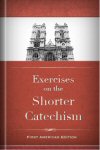
Exercises on the Shorter Catechism features a paraphrase and explanatory notes on the Westminster Catechism. The work also features Scripture proofs and tools for instruction.
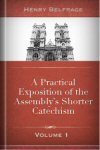
A Practical Exposition of the Assembly’s Shorter Catechism: Exhibiting a System of Theology in a Popular Form, and Particularly Adapted for Family Instruction, vol. 1
- Author: Henry Belfrage
- Publisher: William Oliphant and Sons
- Publication Date: 1834
- Pages: 435
This work from Henry Belfrage is designed for family instruction. It is a valuable tool for studying the historical instruction of the Westminster Shorter Catechism. Volume one contains a history of the Shorter Catechism and covers the first 52 questions.
Henry Belfrage (1774–1835) was a Scottish divine of the Secession church. He preached his first sermons at the age of ten, and became known as “the wee minister.” He attended the University of Edinburgh.
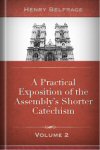
A Practical Exposition of the Assembly’s Shorter Catechism: Exhibiting a System of Theology in a Popular Form, and Particularly Adapted for Family Instruction, vol. 2
- Author: Henry Belfrage
- Publisher: William Oliphant and Sons
- Publication Date: 1835
- Pages: 427
This work from Henry Belfrage is designed for family instruction. It is a valuable tool for studying the historical instruction of the Westminster Shorter Catechism. Volume one covers questions 53 through 107, and includes an index of important terms.
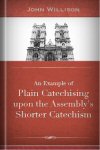
In this classic volume, respected catechetical writer John Willison provides an aid for youth and new Christians in learning and understanding the Shorter Catechism. It is a straightforward exposition of the Shorter Catechism. Willison’s preface includes a short defense of the Christian faith.
John Willison (1680–1750) was an evangelical minister of the Church of Scotland. He worked hard but unsuccessfully to reconcile the church with Ebenezer Erskine and his fellow ministers who went on to found a separate presbytery.
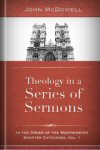
This work collects a series of sermons by Presbyterian minister John McDowell. McDowell gives a summary of Christian theology, following the outline of the Westminster Shorter Catechism. Volume one contains 51 sermons corresponding to the first 51 questions of the Catechism.
John McDowell was pastor of the First Presbyterian Church in Elizabeth-Town, New Jersey
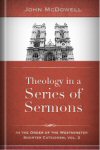
This work collects a series of sermons by Presbyterian minister John McDowell. McDowell gives a summary of Christian theology, following the outline of the Westminster Shorter Catechism. Volume two contains 56 sermons corresponding to the last 56 questions of the Catechism.
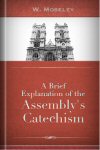
This classic volume from Scottish theologian John Brown—originally published in 1764—offers explanatory notes on the Westminster Shorter Catechism. It is a valuable resource for studying the historic instruction of the Shorter Catechism.
John Brown (1784–1858) was a Scottish minister and theologian in the United Presbyterian Church of Scotland, best known for his exegetical method of preaching. He was educated at the University of Glasgow and served as minster of several congregations in Scotland as well as professor of exegetical theology to the United Presbyterian Church in Edinburgh.
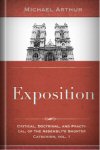
This classic volume on the Westminster Shorter Catechism offers explanatory, critical, doctrinal, and practical notes on the Catechism. It was compiled from a series of lectures from Presbyterian minister Michael Arthur. Though originally intended to be three volumes, only the first volume was ever produced.
Michael Arthur was a Presbyterian minister in Edinburgh in the eighteenth century.
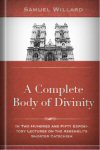
This classic volume’s first printing was read by the fathers of Jonathan Edwards and Benjamin Franklin. Samuel Willard’s massive volume contains 250 sermons from the colonial clergyman. They follow the outline of the Westminster Shorter Catechism.
Samuel Willard (1640–1707) was a colonial clergyman. Born in Concord, Massachusetts, he studied at Harvard and was minister at Groton for thirteen years and pastor of the Third Church in Boston from 1678 until his death. He was an ardent opponent of trials for witchcraft and was acting president of Harvard for the last six years of his life.
About the Westminster Assembly
The Westminster Assembly of Divines was a synod of British clergy, theologians, and members of Parliament during the lead-up to the British Civil War tasked with restructuring the Church of England. It began on July 1, 1643, with a sermon preached by William Twisse in the nave of Westminster Abbey. Most of the Assembly ceased attending meetings after the new regime required an oath of engagement to the Commonwealth in 1649, though nominal meetings continued into the 1650s. The Assembly produced the Westminster Confession of Faith, the Larger and Shorter Catechisms, liturgical manuals for the Churches of England and Scotland, and other subordinate standards. The Assembly worked in the Reformed tradition according to covenant theology, taking the Bible as the authoritative word of God. Though the Assembly’s work was repudiated during the restoration of the monarchy in 1660, the Confession of Faith and other standards remained the definitive Reformed confessional literature throughout the English-speaking world.
Reviews
4 ratings

Robert Ringland
1/28/2019
Why God? What does the creature exist for? Just look at the first question. What is man's chief end? This is the full package, what we have to do now is unravel or unpack the contents. Without God there can be no creation, Without creation it would be futile to make a creature, (for what purpose?) But God the Creator in his infinite wisdom can foresee the enjoyment his creature will embrace. In this state of enjoyment the creature is capable of bringing glorification to his Creator. Which is why he is created in the first place.. This is a fascinating little book with so much truth and insight of the Holy scriptures. One that should be found on any Bible reading student's shelf.
Steve Jameson
8/17/2018
Right now, I would settle on just Fisher's ... We start through a sermon series from the Catechism in September 2018, running through Dec 2019. Guess I will look elsewhere. Maybe CCEL or even Google Books ...
Jintae Seok
8/20/2016

Joshua Daniel Simmons
6/5/2014
I am having a HARD TIME understanding why this resource is so dormant in receiving bids from both Reformed Logos owners and the general Church History or Symbolics enthusiast.
CSL
2/26/2014
I'm excited to see this collection produced. The Shorter Catechism has been the primary tool for theological education among the Presbyterian and Reformed churches. The historical works, as well as the commentaries and sermons on it by Matthew Henry, John Brown, James Fisher, and Ashbel Green are particularly interesting.